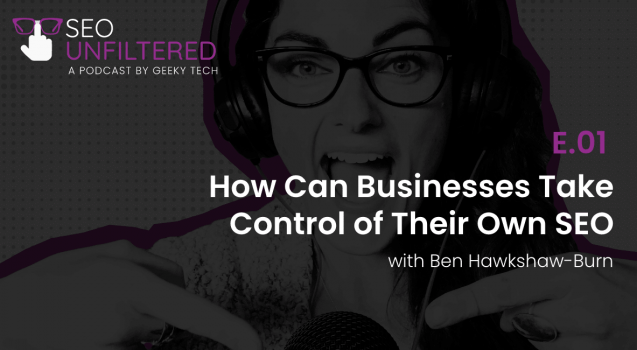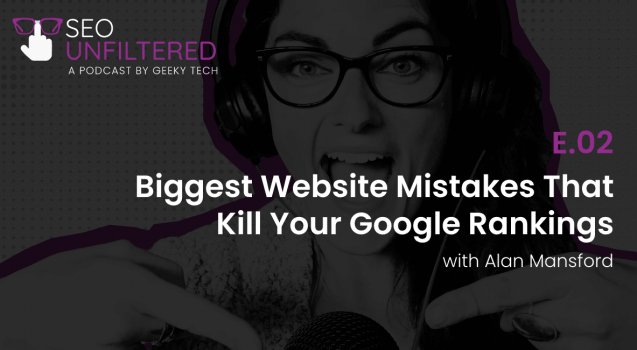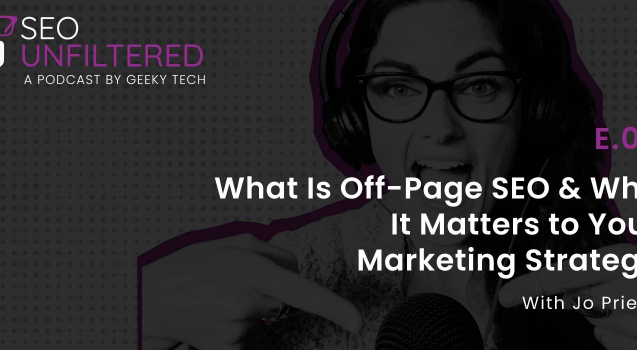Transcript
When I first started writing content for geeky tech, my definition of a keyword was a buzzword that you should add to your webpage so that Google knows what it’s looking at. And while that’s not technically wrong, it’s probably way more helpful to think of a keyword as a search term. I’m assuming that everyone listening understands what a keyword is, but just in case any of you are still stuck on the basics and are just too embarrassed to say, so this one’s.
Whatever a user types into the Google search bar to find what they’re looking for is while we’re talking about, when we say keywords last month, I talked with Joe priest about how to achieve off page site authority, but keyword research really starts with why your site is all about who your customers are and how they search the internet.
So today I’m joined with Mark Hawkshaw-Burn, who also happens to be hot shit in the skater world, but who is more importantly for this discussion? Kiki text keywords, strategist. Hello, mark. How are you?
[00:01:14] Mark: Hey, Jenny. I’m really good. Thank you. How are you? [00:01:17] Genny: I’m well, thanks. So let me start by asking you a basic question.I’ve just been telling our listeners that keyword research is like the very first thing marketers should do or should focus on, but can you tell me why that is?
[00:01:30] Mark: Yeah. Um, basically, can you read research as something that provides valuable insight into queries that your target audience or your potential customers are actually searching for on Google or other search engines, the competitors, for example, the competitiveness of those key words, and then it can help you guide your content marketing plan, which will in turn increase organic search visibility rankings on traffic.So. Yeah, it’s just really useful.
[00:02:00] Genny: Okay. So it’s the basic building blocks.Mark: Definitely. So with SEO, we normally talk about like the three pillars of SEO or the three main things and you got strategy, which is keyword research on page and then off page. And obviously today we’re talking about strategy.
[00:02:15] Genny: Okay, cool.So why do you think so many marketers struggle with knowing which keywords to use for their website?
[00:02:21] Mark: Uh, yeah, I think there’s probably, um, a combination of things which would be maybe not quite knowing the terms that their customers are referring to the product or services they offer us. Um, so. You know, for example, we might have terms at geeky tech that we use for certain things, but then our customers, or, you know, Jenny with the J for example, who we’re trying to market to our avatar yet.Sorry, the concept. Oh yeah. Our avatar might not actually know the meanings of those terms because they’re too geeky or because they’re just seeing it in a slightly different way. A slightly different place in the funnel. Um, so I think that is a big part. And then sometimes it’s just getting lost in the words that they believe or that, you know, it’s what people might be searching for, how they described their own business and service rather than looking at the data.
So, you know, an example could be something really broad and generic, and it’s like, we, you know, we want to rank for that. And this is what we think is good. But then in reality, that was not transactional or it’s too generic. Not the right people looking for it.
[00:03:27] Genny: Okay. Okay. When you say, sorry, when you say too generic, do you just mean like computer? [00:03:34] Mark: Yeah. So well, oh no, no. Yeah, definitely. So it could be anything from computer and I’m sure we’ll talk about some other stuff later, but computer or software or whatever. You know, computer company or it support for example, on its own. And obviously some of those key words are going to be way too generic because if you’re searching for computer, it could be anything and everyone, and it’s probably a Wikipedia page telling people what a computer is, which you don’t want to read.You might sell computers. But we need, you know, you need more so that I think that’s, that’s a really important thing to remember is just because that’s what you do sometimes needs a little bit more than just the generic or what we call it. You know, like we wouldn’t want to rank Kiki what we’d love to engage your tech for SEO, but at the same time, It’s not going to bring customers to us.
Cause most people looking for SEO don’t understand what the acronym SEO is.
[00:04:32] Genny: Okay. Okay. Fair enough. So, have we ever worked with a client who was surprised by like their most profitable keywords? [00:04:39] Mark: Yeah. I’ve definitely had a few clients that are surprised by the amount of people searching for certain terms that they’ve previously written off.Um, or they’ve not even considered because they thought. Too long tail or too generic. And then it turns out it actually works. And again, in that case, we’re looking at computers, maybe not a great example, but let’s say you’re no, no, no. It’s a good example, but it’s so generic, you know, there’s certain things that you could be looking at.
I’m sorry, I’m trying to think of that technology examples, but let’s say you’re looking for tech marketing agency or tech market. You know, tech marketing agency is going to be a more transactional longer tail keyword versus tech marketing. Cause tech marketing just might be people looking for technology marketing rather than an agency to help them with their marketing within the tech space.
[00:05:31] Genny: And in your role at geeky tech, you spend a lot of time working on keyword research and strategy for our customers. So can you tell me what the difference is between researching the right keywords and creating a strategy around them? Do we, what do we mean when we’re talking about strategy? [00:05:47] Mark: Sure. So, um, keyword research is like costing the net wide.So you’d be looking at all the potential options that are out there from your own data within analytics, search queries, AdWords, and then all your competitor data by using tools and seeing the keywords they’re ranking for the pages that they have, the content that they’re putting out, et cetera. So that’s the research side of things.
And then strategy is refining that process. So. That’s sort of listening to work and art from our, from my eyes, even it strategy is, you know, refining the process by listening to the customer and their particular needs the services and the business they offer or that they specialize in and then creating a plan that works for them from an SEO perspective.
Um, so for example, you might opt for a plan. You tackle low hanging fruit, which would be like lower search keywords, lower search volume talent with like a lower difficulty that would be easier to rank for, to begin with. So a lot of times at the. If they’re just entering the space, they’re kind of dipping their toe in the water.
Um, they might not have loads of budget and resources to go off to some huge computer or, you know, tech marketing term. So they’ll go for a longer tail keyword, which would be like, you know, tech, marketing agency, London, or, you know, Anything that’s slightly more, um, that’s a little bit easier to rank for.
There’s less people searching for. You might only have 10 people a month searching for that term rather than a thousand or 2000 that are searching for tech marketer. And then they will. Uh, use that to sort of show that it works, you know, and get the results first. And then later on without content that’s got, you know, that work on keywords and build out content on higher search volume or more generic or more competitive terms for example.
And they would, so, yeah. So going back to what we’re talking about, strategy is that’s basically refining the process. Of what the client or what you need to S to offer to your potential customers and the strategy of your business. So for example, we specialize in SEO and Google ads or paid advertising, and we would want to then put our focus, maybe an SEO to begin with, and then paid ads after if we were talking about SEO keywords.
Um, and that would, yeah. And that’s just kind of perspective. So a few clients I’ve had recently, um, where they do like automation and consultation around automation and they offer like, let’s say three products or, you know, three main products and that, you know, they offer 15 different services on their website.
Right. But they’ve just said to me, like, you know, for the next six months, the three products are our main focus. So then I would build acidy around those three products and then kind of in the pipeline, half the other stuff, after that initial push for the, you know, for the three main services or products that they want to prioritize right now.
Hm.
[00:08:44] Genny: So sorry, just out of curiosity, how long does this strategy phase take you customers? [00:08:48] Mark: In general, um, in general, in general, it depends. So we I’ll do a lot of keyword research beginning that can be anywhere from 15 to 40 hours, depending on. The whole process talking to a client, et cetera. Um, but then we also, for our customers, we carry out regular keyword research on a monthly basis where I’ll look at their competitors, look at their keywords, listen to suggestions or areas they want to focus on.And then I’ll kind of do a mini version of that initial kind of audit keyword research on a regular basis, but it can be. Um, for Jenny with a J or people maybe without the resources or access to the tools essentially that we have, you could certainly do it in a much shorter period of time, um, by just of making common sense, um, making common sense decisions, looking within Google and things like that, and using a few basics.
[00:09:39] Genny: Okay. So you mentioned competitors. So I just want to talk about that for a second. So let’s say you have a software company and you’re currently ranking on page. I don’t know, four for your main keyword. Do you really have any chance of reaching page one result one just by adding the right keywords to your website.Like, can you reasonably reasonably expect to outrank, like the big, big companies, if your marketing budget is like nowhere near the likes of, I don’t know, SAP or Salesforce or Grammarly or whatever?
[00:10:08] Mark: Um, yeah, no, definitely. Um, the answer for that. Yes. It really depends on the keywords and the competitors.Certain big players in certain industries will dominate based on brand and budget, age of the website. And you may struggle to rank in position one or on page one for high volume, high difficulty searched. Such as software company. So for example, again, we use the various, we use various tools, but approximately, you know, these tools are based on averages and they’re probably not that accurate, but the approximately the UK, there’s around 2000 searches per month for software company.
And then in America is there’s 9,000. I think it’s more than that. It’s definitely more than that, but this is like a, an average based on the tools of. And a difficulty score of 83 out of a hundred, which means if you’re a brand new software company and you want to rank for the keyword software company with a limited budget, and you’re going against some of those massive players, you’re going to need, you know, hundreds of links and hundreds of pages of related content at a big budget, to be able to even just get into that race.
Um, so. Yeah. To answer your question. No, in that case, if it’s a, if it’s a. Uh, you know, like software company, quite a generic difficult key word that a lot of other big players with a lot of budget and money are going for. Um, that being said, as I talked about before, you can easily rank for related or longer tail keywords.
Which might have a higher intent. So let’s say for example, you’re a software company based in London, or you can service clients in London or New York. You could easily go for software company London, for example, which would have a 10th of the search volume, maybe 150 or 200 people a month looking, but then a third of the difficulty around 30, and you only need like 10 or 20 links along with, on page, or you can maybe even just.
With keyword research and then creating the content and on page optimization. So it’s, it’s, it’s kind of a case by case basis. And that’s being said just because those big brands, Salesforce, Grammarly, or SAP. Uh, ranking doesn’t necessarily mean they’re following SEO best practices, and it doesn’t mean that you could not rank them, but it’s likely that for certain terms, it would be very difficult if you’re a new, a business to compete.
And that’s why you’d want to look at. Little niches or slightly longer tail keywords to stand a better chance and to make them, you know, to get, to get the most of your limited budget or money, you’d be better off going for longer tail or maybe keywords that they haven’t invested as much into. And that’s why it’s so important, right?
Because if I go look at Salesforce or whoever that we’re talking about, and they’re ranking for software company, and I see how many people are looking for it and how difficult. I’m not necessarily going to suggest to a smaller pilot, that this is a good option for you. I’m going to look at the more appealing keywords that they could rank for that they will get leads.
That will take, you know, a couple of months rather than years and lots of money and lots of budget and resources.
[00:13:30] Genny: Okay. Um, when you say difficulty level, where’s this working, uh, users find this much. [00:13:36] Mark: So again, there’s a few different tools that we use, uh, dress key search, SEMrush, Moz, et cetera. And basically when you put in a keyword into these tools, They will give you a few different metrics, but sort of the main ones that I’d be looking at for certain things is search volume.So that would be to make sure there’s it’s worth going after, after that term. So although sometimes those numbers are very inaccurate, it’s just the baseline. So if it says 2000 people, it’s likely more, um, just from the research that we’ve done and looking in our own search console consultation. Um, it’s likely it’s more, but, you know, we can see there’s value in having a page, creating content and talking about that topic because there’s a lot of people looking for it on a regular basis.
Right. Whereas if you were looking for the spoke software company in, uh, Mayfair London, there might not actually be anyone looking for. And there might be people looking for, or there definitely will be people to confer bespoke software company. And there’ll be people probably looking for bespoke software company, London, but maybe not just in Mayfair specifically.
And if you put budget and time into creating a page and, you know, putting a keyword in, it’s unlikely, you’re going to, even if you do rank position one, if nobody’s looking for it, it doesn’t. ’cause you’re not going to get any, right. Um, so I won’t mention the client’s name or particularly what the keyword was, but we had a client recently where they really wanted to rank for this term.
And this was during the kind of setup phase where we’d already selected their keywords. And we were working on them with the client and they had like, I would call it a vanity 10 because they wanted to rank for this term. That to them meant a lot to kind of show other people. And for us, it was easy because there wasn’t really any difficulty.
Um, but there wasn’t anyone searching for it. So they then put resources into, you know, optimizing or right, adding keywords and optimizing this page to rank for it, which they did. And they rank in position one and they’re happy, but they don’t get any traffic. So that’s why search volume is an important metric to ensure that you are, you’re not wasting time and resources on a dead horse, basically.
And then the other metrics we’d be looking at would, well, I’d perfectly be looking at sometimes it’d be cost per click to see how valuable it is. So if people are paying like 10 or 20 pounds or $20 per click, normally that are there some good intent there because. People wouldn’t be clicking on those terms and they wouldn’t be paying that much.
If there wasn’t a lot of competition within ad words for that. And then thirdly, we said difficulty, which again, this there’s different tools that measure it differently, but typically a few of the ones we use, they judge it between zero and a hundred, a hundred being the hardest and zero being the easiest.
Um, We have different, different kind of ideas and these can all be tested. And it all depends on the website, but typically anything like between zero and 20 or 30, you could just put the bright keyword in the right pace, right. The content and probably ranked. Um, without too much off page links, et cetera, you will need some on-page optimization, um, which you can use our best practices for, and then anything above that.
So, for example, when we’re talking about software company, 83 or 86 out of a hundred, You know, you’re going to need hundreds or thousands of backlinks on top of a really, really thorough 3000 maybe word article around software company, talking about all of the different types and the whole history. And you know, it’s a Bible piece almost.
I imagine again, I’d have to do for research to look at this, but so to spin it back and answer your question. Yeah. Search volume and difficulty is important metrics just as we said, from the very beginning, which is it’s just to validate the reason that you’re doing it, if that makes sense. Okay.
[00:17:42] Genny: Yeah.Yeah. I was actually, you had already answered this, but I was actually just curious, what’s your version of a good difficulty rating. So yeah, everyone’s zero to 30. Good start.
[00:17:52] Mark: That’s it? Yeah, that’s a good stop for sure. Anything below. This is good for me. [00:18:00] Genny: I do really need to understand who you’re up against and their keywords in order to start your own keyword strategy. [00:18:08] Mark: Um, you can do it without, but ideally I would say yes, because imagine you’re preparing for a race, but you don’t know how far you’re running or for how long that’s kind of what it’s like SEO.So by looking at your competitors, you can see what they’re currently doing. You can kind of maybe see a little bit of what they’ve done or what they’re already ranking for. Um, and you can kind of get an idea of where they are at, which will at least match or improve or go down a different route depending on what they’re doing.
So, for example, when we talked about, you know, Salesforce and SAP and software company, uh, a few minutes ago, if you looked at those massive players and they’re your main competitors, First, you could then realize a case software company is not for me yet. I need to start going after longer tail keywords, which have lower search warrant at low difficulty that I can win, but will then show Google that I’m relevant.
And I have good content and I can service the people search and this term. And then at a later date, you can go and try and go after those bigger, uh, you know, those bigger fish. So I think it’s really important basically to find out what your competitors are doing, or at least look and see. And some competitors aren’t doing a lot from an SEO perspective and some are, but it is certainly an interesting insight.
And one of the things that our customers really do find interesting sometimes is when you show them. What their competitors are ranking for. And some of the keywords are really relevant and some of them are rubbish. And you can also see sometimes if people are doing SEO and if they’re not doing SEO, just by looking at sort of rankings, et cetera.
[00:19:50] Genny: Interesting. Okay. So what’s one of the easiest ways a marketer can kind of nuts. Was it spying on the competitors? [00:19:58] Mark: See what they’re up to? Yeah, I guess that’s one way, some people are super savvy and they don’t let the tools cruel their sites. Um, so there are some people you struggle with looking at, but most people don’t know.A few things. Really. I was, uh, I would say they can be as simple as going to your competitor’s website and looking at the menu and the pages and the layout of that and the products and services. They offer reading the content and see like the angle they’re coming from the kind of content they have on their site, the services that are in their menu and how they’ve structured their site, just to see sort of how they’re doing things, because.
That might not necessarily be SEO related with some businesses, but it’s still important to know kind of the space that they’re operating within looking at their blog, looking at the content they’re producing, because you can then see from just looking at this. Okay. They have a page on software or software company.
They have a page on application development, the different areas potentially that they’re going after. And then you could be like, oh, okay, I need to do this. Or maybe I need to go down a different route and go for something that these guys aren’t looking at. That’s one of the main things I it’s really simple.
And it’s not as technical as you would think, but yeah, sometimes I’ll do that. For competitors for our customers, I’ll just look at their menu and the services and kind of see if that aligned with what our customer’s doing and if they are a true company. Um, the other thing I’d recommend is trying a few SEO tools, putting your competitors into those tools and seeing which keywords they’re ranking for this will help get you a good idea of where to start.
Oh, tools like, um, there’s loads out there. Uh, key search H ref SEMrush, Moz loads, more personally at the moment I’ve been experimenting with H refs and I find it quite. Pretensive so, although I do use the other tools, that’s kind of my benchmark. Okay.
[00:21:53] Genny: Are any of them free? [00:21:55] Mark: Some of them are free. Some of them have free trials and some of them are paid, but there’s certainly free ones out there.I’m pretty sure key search is free and SEMrush. I can’t remember now, but there’s a couple there’s free options. At least you might have to pay eventually. Um, but there is free ones out of that.
[00:22:13] Genny: Okay. Okay. So what if, uh, when you’re researching your competitors, you find out that your biggest three main competitor is already outranking you for the keyword you really want, and you just don’t have the budget or the resources to outrank them.I mean, I think you may have said this a few times. Do you just go off to the long tail queue?
[00:22:33] Mark: I just give up as you yeah, it’s over, um, business. Um, yes. And this goes back to your earlier question around strategies. That’s why it’s important to, to look into keyword research, to, uh, to do that research and to find a keyword options and cast the net quite wide.So that then when you realize, or if you realize that this is, uh, you know, your. You’re a small fish in a massive pond. That’s when I would recommend looking at alternative keywords or longer tail keywords. That again, you will stand, stand a chance so that you could be, you know, a bigger fish in a smaller pond.
Um, and then also that will help you in the long run because you’ll be creating relevant content that is around the main subject, but, you know, software company in London, bespoke software company rather than software company. So then at a later date, when you do go after those key words, Google see that you have relevant content on the site, you have people coming to the site, you’re already ranking.
For some of these longer tail keywords and it will only help. And then you can link those pages to your main software company page, and it’s going to help in the long run. So definitely don’t give up, look if alternative things. And again, as I said, you know, if, if it really is a losing race, which there’s always longer tail options out there, if you, if you live at home.
Um, but yeah, definitely don’t give up, look at. Longer tail options and supporting content, or even just helping answering questions or things that people might find useful, um, that were in that place that you could rank for rather than the main massive headlines. Um, um, the other option is you could just create a piece of content around the main headline term, knowing that you’re not going to rank really well for it, but it might bring in a bit more data for you to.
Better educated decisions on longer tail keywords.
[00:24:38] Genny: Oh, cool. Okay. So if you have a page that’s ranking in Google, but not within the first 10 results, are there small tweaks or changes you can make to increase its rankings? Or should you start all over again? [00:24:49] Mark: Oh, no definitely case by case sometimes or keyword by keyword, but you can definitely make small tweaks to heading tags content to help with the rankings if you’re not in the first 10 results, but you are there.So typically if you have a relevant page that’s ranking on like page two or page three, Um, but not on page one, small tweaks will help increase its rankings depending on the difficulty of the keyword and your competitors. Again, this, it’s hard to put this into like compartments as such, because it all depends on each thing, but typically if it’s beyond page three and it’s an older piece of content, so let’s say you wrote a piece of content a year ago and it’s in position first five or 40, I would usually recommend a complete review.
Or a big content refresh, um, to make tweaks. And then obviously you would need to do some on-page stuff on top of that, to be able to stand with the right, uh, to be in with the chance of ranking for it. Because if you made a piece of content a year ago and it hasn’t breached, you know, page three, it’s unlikely that it is good enough in Google’s eyes to compete with those top 30 positions or whatever.
[00:26:03] Genny: Okay. Yeah, that makes sense. I have a really random question. Well, not random, but it’s not really about what we were talking, what we’re talking about. What’s the difference between keyword themes and clusters, because these words are thrown around a lot and I’ve just, I can’t tell the difference. [00:26:16] Mark: Um, yeah, so it’s essentially the same thing.It’s just different, different people have different ways of describing it, but in kind of my eyes, a key word, clustering or theming is grouping keywords by relevance to enable you to go after multiple relevant keywords. Per page on your website. So a single cluster includes a core topic and then several related subtopics, which support and point back to the core topic.
[00:26:48] Genny: So let’s just say we have software company in London. As the cluster, could that be a cluster or is that [00:26:55] Mark: you could be, so you could have software company London and you might have software company, south London, software company, north London, east London, west London in that same cluster. You might not don’t hold me to that guys.It’s probably their own separate pages, but in theory, yes. So we’ve had clients where it has been, for example, a software company. You know, postcode related and w one and W2, NW, B3, or Kensington, and Chelsea they’ve managed to rank, for example, software companies, Kensington software company, Chelsea in the same with the same page.
And just by having those two in the same cluster. So it basically in the short, in short or in summary, it allows you to target many keywords per page, rather than only one. It creates additional opportunities for content to be found online.
Yeah. Yeah. Oh yeah, definitely. And we use, we use a various amount of tools, common sense. We check the results in Google to see whether a terms the same. Cause that’s where it all kind of. Um, that’s where it all stems from is, is the key word. That is the key. So is the cluster, does, does Google see the cluster as the same?
If that makes sense. So if you search software company Kensington and you search software company Mayfair, or Chelsea, does Google show the same results or not? And it won’t. And that means that. That means that, you know, they need separate pages. If the search results are different, you will need separate pages.
So, um, good example that I have from earlier this week, um, extended warehouse management and SAP, extended management and extended warehouse management, SAP, extended warehouse management, SAP EWM. Okay. So that, when I looked at that in my head without looking online, I would think SAP EWM and SAP extended warehouse management would be in the same cluster.
Extended warehouse management would be in its own cluster, which is a more generic term. So that’s how I would categorize it myself before doing any research. But when looking in Google, speaking to the customer, extended warehouse management is an SAP related. Is there anyone looking for that without equity is an SAP term created by SAP or products or service scraped by SAP.
So the association in Google’s eyes is the same. So all three of those key words can be in one cluster and you can rank one page for all of that. You can make keywords on one page for all of those. Wow. Okay. Potentially, um, I think in the future, there will come a time where. Google get smart. And every single keyword will need its own page.
Um, but at the moment you can get away with. Multiple keywords ranking for one page, but typically within a cluster you would have like a target or a main keyword. And then those other ones, as I said, would be like relevant subtopics that point back or topic within the text. It’s all case by case keyword by keyword, um, cost to by class.
But it enables you the chance to get more exposure. And so, for example, if you had all three of those SAP terms, I mentioned on one page, you look in your Google search. Um, you can look in your Google search console and look at the queries. And let’s say you put that piece up six months ago. You can look back on six months worth of data and you can see.
Those terms individually and which ones were more popular, how many times they were searched for. And then, you know, you can see, you can see data on whether people are coming through on those terms, et cetera, and then you might want to split those out. Um, so if we then check the rankings for those three different terms, and let’s say the SAP extended warehouse management is ranking position one page one, but extended warehouse management is struggling.
You might find that in a few months, time, Google is smart and realize those things are slightly different or that, uh, there’s another offering without the SAP and you then need to create a separate page. But at the moment, the research and Google is saying, you can put them all on one, if that makes sense.
[00:31:35] Genny: Okay. That sounds so complicated. [00:31:37] Mark: It doesn’t lie. Yeah. It’s really not that complicated, but it’s basically like, again, going back to like the horse racing thing. Put your software company, horse in the race or software company, London in the race mentioned north south, east, west Kensington Mayfair on that page with, you know, within the software company element.And then you can look at your own data to see which one’s worth going after and investing in that’s providing the tools. Don’t have a baseline for you, or you feel that the tool data is not great.
[00:32:09] Genny: Well, I feel like I just learned so much. Um, okay. Let’s move on. Sorry. Just, okay. What’s the biggest mistake you see marketers making when it comes to this part of their SEO? [00:32:22] Mark: Um, again, probably just what we talked about, which is too many keywords on one page and spreading it too thin. So again, lots of horses and a lot of races, but you’re not really winning anything. Um, cause you’re not ranking well enough because that one page is ranking page two or page three for 20 different terms because you try to cram it.Um, the other thing you, you, you have issues with is around the same thing where you have this one mega page, where, as I’ve said, this one mega page where they’ve mentioned, you know, little paragraphs of content on all of these different services they offer. But they haven’t paid dedicated pages. Um, so some clients they’ll have a services page.
The services page will be this marathon page about the 10 services they offer. There’s only little paragraphs on each service, but they don’t have individual service pages. So all of that one page is ranking for like 10 different service terms, but not very well. So, what they need to do is then break those services pages up into individual pages to create 10 services pages.
You know, again, we use in software company a lot, but software company, bespoke software company, you know, uh, software company, London, software company, New York, or, you know, whatever they need to break those things up or AI, software development, uh, app development, and then software company. They need to break those services up into different pages.
So that those key words and those pages aren’t there. Isn’t just one page trying to rank for everything. You’ve got lots of, you know, you’ve got a horse, a dedicated horse for each key word in the race or a dedicated page and a keyword associated in the race.
[00:34:11] Mark: That’s the biggest mistake I would. I think that’s one of the things that I see again, not doing their keyword research.Um, not utilizing like H one tags and heading tags. That’s all off page though. Uh, sorry on page. Um, um, yeah, so not as if yeah, there’s a few different things, but. When it comes to this part of SEO, I’d probably say just not understanding keyword research or the strategy or not doing enough at the beginning of a journey to work, work out what they, you know, what they want to do and forgetting about SEO for a second and taking a step back.
They need to sort of know what their business offers, what they’re good at. To then be able to work out what sort of content they should keyword they should add. Anyway. So all kind of on a goes, goes hand in hand. Um, but yeah, tools and common sense, Googling a word, looking at the results is a good way, um, to see keywords differently.
Um, so that’s another thing, I guess the mistake that I see marketers making at this point with SEO is I’ll do a load of keyword research. And they’re really hell bent on specific terms because in their heads, that term is like a that’s the term. But when you look in Google, you know, it’s jobs or it’s something not relevant or it’s a university degree.
You know, course, uh, you know, for you, you can do a uni course on this, but in their head, this term, we want to rank for that term. And then I have to say, Google it, look at that keyword. You look at the results, the results are. Universities or jobs or indeed, and job sites, this isn’t where you want to be, because then you’re going to have to fight with those, uh, you know, job websites, blast, or whatever, and you have to fight against those to rank.
And then even if you do rank the people looking for it, you know, on the people that you want.
[00:36:13] Genny: Yeah. Yeah, exactly. Okay. That does make sense. Yep. So let’s just say a client has a webpage and their keywords are so off and they have no chance of ranking for it. Um, They have this page with the URL. Is it better for them to just create a new page or just sort of remove their old keywords and add in like more sensible keywords?Just does that make sense with Google, does Google understand that?
[00:36:41] Mark: Um, so you were saying they have a web page. They have pages sucks that it sucks. The content sucks, but they’re not ranking or they have no chance of ranking. [00:36:52] Genny: They have no chance of ranking for what they want to rank for. And after you’ve done your research, you say, actually, you should be trying to rank for these words.Do you just take those old pages and swap them out or the right keywords or so
[00:37:06] Mark: it really depends on the client, their website and the keywords. Um, but typically if they have little to no existing rankings or the rankings they do have are not relevant, or as we said are. Maybe too low down, you know, page four, page five, or they’re not ranking anywhere.I would typ-typically recommend creating new content around the strategy that we work on together. After the initial keyword research, that being said, it is possible that you can use existing pages or content and can salvage it and update. It really depends. Um, It depends on you and the areas that you’re looking at, it depends on the page if there’s any current rankings.
Um, but again, as we said, if a pay, if you’ve had a page up for awhile and it isn’t ranking very well, and it’s not being picked up in a, in an okay spot in Google, it’s likely that you haven’t done enough. To be within the top couple of, of pages in the search engines. One, one way you can kind of look at that from without tools or without anything is Google that search term that you want to rank for.
Look at those top 10 competitors or the top eight or the top four. Look at their pages, how many words they’re using, you know, what heading tags that have, you know, what are they offering to the people that search that term compared to your page. And then you’ll be able to see whether you’ve done enough or not.
[00:38:35] Genny: But if you just completely rewrite the page, for example, It’s not going to mess with the, Google’s not going to be confused or you won’t be penalized or you won’t be, you will have no chance of ranking based on the yes. [00:38:46] Mark: So if you have an existing page and it is in the race, to an extent there is options of having content, et cetera.If you’ve got a brochure page that, um, that has the key word or the thing you’re going after, but the content is quite light. You can also add more content, add more keywords onto that and salvage what you’ve already. Um, it doesn’t serve purpose. You can just create an S a dedicated SEO page with brand new content.
It really depends on the search term difficulty, what you’ve currently got and the rankings, your competitors as well.
[00:39:24] Genny: Okay. Okay. Um, well, I feel like we could probably talk about this topic for hours and hours and hours, but rather than have you explained everything in great, great detail. Again, I’d like to encourage our listeners to head over to our geek, speak blog and check out the various posts we have written about this exact topic.I will be linking a few of those posts in the show notes for everyone’s convenience, including the on-page best practices that you mentioned on that note. Mark, do you have any. Bits of advice for our listeners who want to nail their keywords and rank higher in Google.
[00:39:54] Mark: So, yeah, besides paying Kiki tech, um, to help you with your keyword strategy where you will be dealing with me, who can help you on that journey?Um, my top tips for marketers or listeners out there would be try and get into the mind of potential clients or people searching for your product. Um, Google the keyword yourself and check if the results are relevant. And if this is a race you would like to be in, have a Snoop or a nose or a spy, as Jenny would say on what your competitors are doing, don’t be scared to try, write some content, you know, pop a word in the heading tag, um, you know, add a little bit and see what happens.
It’s probably not going to hurt. Check out our best practices guide. I’ll get Jenny to, to add a link, um, on, on page stuff. And it will also help maybe with keywords or just understanding. And there probably will be more content from us coming around, keyword research in the future, write good quality content that provides value to say.
[00:40:56] Genny: So, is it actually way more straightforward than everyone thinks it is? [00:41:00] Mark: Yes and no. There’s a lot of free tools out there. There’s a lot of common sense that can be used and you can make a good go of it. We have a few clients that come to us, um, and a few that have joined recently where they’ve actually done an okay.Themselves before taking us on, and then we can help sort of utilize that and maximize what they’ve already done. And then, yeah, that’s kind of where I’d, where I’d go is have a go. It’s not that hard, but there is a lot that goes into it at the same time.
[00:41:34] Genny: Well, there you have it, ladies and gentlemen, your keyword strategy is a fundamental building block of SEO success.And if you have a nail down your list of the most profitable keywords, then you really can’t move forward with optimizing your site. So be sure to treat this step with care and. And on that note, mark, thank you so much for stopping by today and thank you listeners for lending us your ears for this hour or so.
And if you’re about to embark on this complicated sort of fast paced world of advertising, stay tuned for episode five, where I’ll be chatting with media expert Ammon, who will run us through the pretty complicated world of people. I don’t know if it’s that complicated. Anyway, don’t forget to follow us on Twitter, Facebook, Instagram at geeky tech geeks for all things, SEO and advertising related.
And lastly listeners, just a small favor. If you like what you heard today, be sure to subscribe like and follow us on apple podcast, Spotify, Stitcher, or wherever you listen to your favorite shows. Thanks. Bye Mark.
Show Notes
What’s up marketing Geeks? Let’s take this SEO chat all the way back to basics. More specifically, keywords. What are keywords and how do they help your website get seen by the people you’re targeting?
Welcome to season 1 episode 4 of SEO Unfiltered. In this episode, Genny gets a-talking with keyword specialist Mark Hawkshaw-Burn and together they unravel the mystery of keyword research and what marketers like you can do to outrank your competitors and work your way up the ranks.
This episode will be perfect for anyone whose website isn’t attracting the right sort of customer or who can’t figure out why their amazing web pages haven’t landed on the front page of Google.
Mark teaches Genny how to spy (her words, not his) on competitors in order to leverage their success as part of an overall strategy to outrank them (insert evil laugh). If what we just said sounds sketchy, don’t worry. We’re not asking you to go undercover and hack into their Google Analytics or do anything shady.
Mark also walks Genny through keyword value and difficulty and explains how a marketer can use long-tail keywords to put themselves in the race.
Keyword Research: Recommended Readings
Did you miss our last episode? You can hear previous episodes, transcripts, and show notes on our official SEO Unfiltered Podcast web page. Don’t forget to follow us on Instagram, Facebook, and Twitter @GeekyTechGeeks for all things SEO and advertising related. And lastly listeners, just a small favour: if you like what you heard today, be sure to subscribe, like, and follow us on Apple Podcasts, Spotify, or wherever you listen to your favourite shows.













